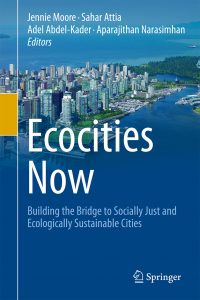
As part of a suite of efforts to support cities and communities on meeting their sustainability goals, Dr. Jennie Moore, BCIT Director of Institute Sustainability, collaborated with colleagues from Ecocity Builders in leading the publication of Ecocities Now. The book details ten of the best papers from the International Ecocity World Summit (the Summit) held in Vancouver in October 2019. The objective of the publication is to accelerate knowledge dissemination about the development of ecocities through attention to what constitutes an ecologically healthy city.
“Whether it is helping communities to rebuild in post-earthquake Nepal, finding nature-based solutions to urban pollution challenges, or demonstrating how people can achieve net-zero emissions lifestyles, BCIT has industry leaders committed to delivering applied education and research that builds a better future for everyone,” said Dr. Jennie Moore. “It is fantastic to see BCIT faculty and students from various Schools and Applied Research featured in this publication. Their contributions demonstrate the range of talent and scope of reach that BCIT offers for communities in BC and beyond.”
Materials presented in the book span the globe with important discussions on what cities around the world are doing, what Vancouver as an emerging ecocity is doing, and how education can play a role in preparing the next generation of ecocity practitioners.
BCIT researchers, faculty, and students from the Schools of Computing and Academic Studies, Construction and the Environment, and Energy, as well as from Applied Research, also authored chapters throughout the book.
- Chapter 6: Informal Solutions Towards Personal Net Zero
- Joey Dabell, SMART Project Leader
- Chapter 8: A Hybrid Model for Sustainable Urban Metabolism in Metropolitan Communities
- Dr. Michal Aibin, Computing faculty
- Students Carson Xu, Son Nguyen, and John Whangbo
- Chapter 9: Capacity Building of Rural Communities in Post-Earthquake Reconstruction in Nepal
- Bishnu Pandey, Engineering faculty
- Chapter 10: Seeing the Forest Through the Trees: Assessing Urban Forest Values Using a Combination of LiDAR, Timber Species Identifier, i-Tree Eco and GPS Ground Surveys
- Julia Alards-Tomalin, Laurie Stott, and Jace Standish, Natural Resources faculty
- Chapter 11: Restoration of an Urban Creek Water Quality Using Sand and Biochar Filtration Galleries
- Dr. Ken Ashley, Director of Rivers Institute, and Dr. Colleen Chan, Engineering faculty
- Samira Jalizi, BCIT alumna, M.Sc. in Ecological Restoration
Ecocities Now is presented in four parts that align with the Summit’s themes:
- Building a bridge to socially just and ecologically sustainable cities
- Climate action
- Circular economy
- Informal solutions for sustainable development
Chapters comprising each part in the book are introduced by a brief summary that orients the reader to the relevant Summit theme and the Ecocity Standards that are being addressed, along with contextual considerations that apply to the international case studies. The International Ecocity Standards serve as a diagnostic tool to help cities assess their progress on the path to becoming ecocities and in developing locally-relevant pathways to achieving the UN Sustainable Development Goals.
Learn more about Ecocities Now book.
